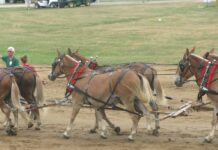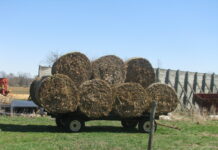Photo credit: DiasporaEngager (www.DiasporaEngager.com).
JNS.org – The Palestinian Authority and Hamas are competing to win the support of large Palestinian clans in the West Bank and Gaza Strip. The competition comes in the wake of the talk about handing control over the Gaza Strip to local clans after the removal of Hamas from power.
The P.A. and Hamas understand that the backing of the clans is crucial for maintaining their control over the Palestinians in both the West Bank and Gaza Strip. That’s why P.A. and Hamas leaders have always treated the large families and their leaders with utmost respect. In some instances, clan leaders were elevated to the unofficial position of supreme judges and arbitrators, replacing the official judiciary and law enforcement of both organizations.
The Israel-Hamas war has undermined the Iran-backed terror group’s grip over the Gaza Strip. Hamas is no longer functioning as a de facto government in the coastal enclave, and most of its security and civilian institutions are in a state of paralysis.
The assumption among some Israelis and Palestinians is that the decline in Hamas’s power would pave the way for the re-emergence of the clans as significant players in the Gaza Strip.
According to sources in the Gaza Strip, a few clans affiliated with the P.A. and its ruling Fatah faction have begun challenging Hamas over the past few weeks. These clans, known to have dozens of armed members, began operating their own enforcers in some towns and refugee camps in the Gaza Strip to prevent looting and other acts of anarchy and lawlessness. At least one clan was reportedly involved in escorting some of the trucks loaded with humanitarian aid that entered the Gaza Strip through Egypt and Israel.
Alarmed by the possibility that some of the families in the Gaza Strip may start cooperating with Israel or the P.A., Hamas leaders have been pressuring clan leaders to declare their support for the terror group publicly. Indeed, a statement issued by several clans in the Gaza Strip recently announced that they stand behind Hamas and the Palestinian “resistance” groups.
The P.A. leadership, for its part, has also been working to gain the backing of the clans, especially those in the Gaza Strip. In recent weeks, P.A. officials in Ramallah have been exerting pressure on the leaders of several Gaza clans not to cooperate with either the Israel Defense Forces or Hamas.
On March 4, 2024, the P.A.’s official media reported that “Palestinian tribes have renewed their pledge of allegiance and support for the sole, legitimate, political leadership represented by President Mahmoud Abbas.”
According to the report, the “tribes stressed their rejection of [Israeli Prime Minister Benjamin] Netanyahu’s plan, which aims to form a civil administration in the Gaza Strip on the day after the war.”
On the same day, P.A. Prime Minister Mohammad Shtayyeh, in opening remarks at the weekly meeting of the Palestinian Cabinet, thanked Palestinian clans in the Gaza Strip for allegedly refusing to cooperate with Israel.
How many clans signed on to the statement pledging allegiance to the 88-year-old Abbas is unclear. It is also not clear whether these clans represent a large portion of the Palestinian public in the West Bank and Gaza Strip. A single clan could have more than one leader—some affiliated with the P.A. and others with Hamas.
What is clear, however, is that the clans will be required to play some role in the administration of the Gaza Strip after the war. Hamas may try to hide behind them as part of an attempt to return to power. Similarly, the P.A. is expected to step up its pressure on the Gaza clans to distance themselves from both Israel and Hamas.
Palestinians have been calling the P.A.-Hamas struggle to control the clans harb al-ashaer (war of the tribes). Both the P.A. and Hamas seem to understand that their success is tied to the clan leaders.
Originally published by The Jerusalem Center for Public Affairs.
Source of original article: Khaled Abu Toameh / JNS.org / Opinion – Algemeiner.com (www.algemeiner.com).
The content of this article does not necessarily reflect the views or opinion of Global Diaspora News (www.GlobalDiasporaNews.com).
To submit your press release: (https://www.GlobalDiasporaNews.com/pr).
To advertise on Global Diaspora News: (www.GlobalDiasporaNews.com/ads).
Sign up to Global Diaspora News newsletter (https://www.GlobalDiasporaNews.com/newsletter/) to start receiving updates and opportunities directly in your email inbox for free.































